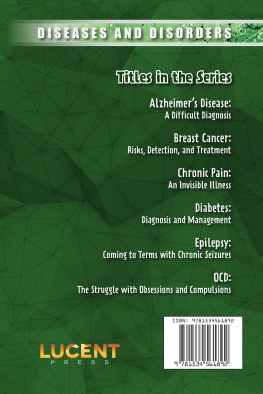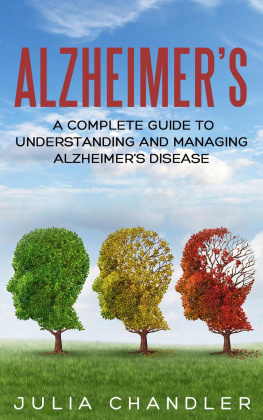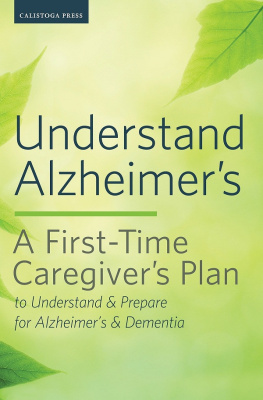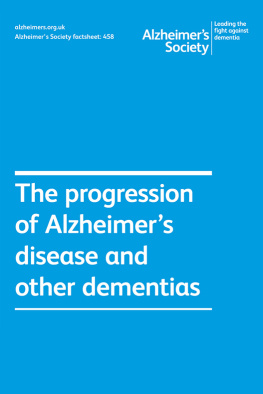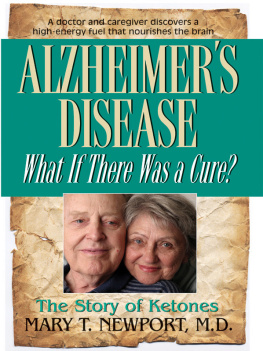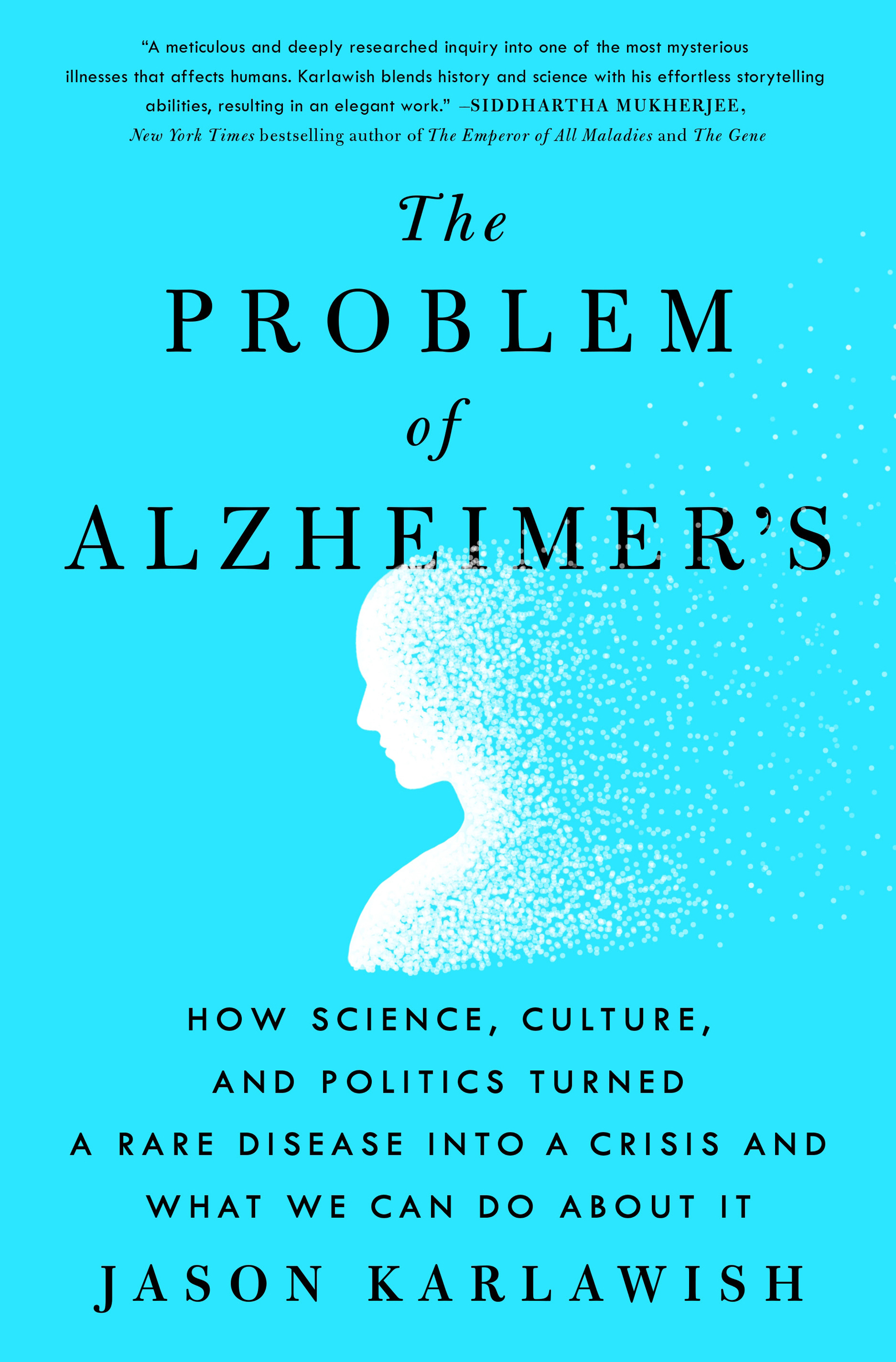The author and publisher have provided this e-book to you for your personal use only. You may not make this e-book publicly available in any way. Copyright infringement is against the law. If you believe the copy of this e-book you are reading infringes on the authors copyright, please notify the publisher at: us.macmillanusa.com/piracy.
It is the worst of all diseases, not just for what it does to the patient, but for its devastating effects on families and friends.
Lewis Thomas, The Problem of Dementia, 1981
BY THE COLD Friday afternoon in January 2010 when I met Edith Harrison for a new patient appointment at the Penn Memory Center, her memory problems had been going on for at least four, maybe five years. Her husband, Ed, struggled to pinpoint exactly when they started.
At first, the problems were subtle. She was making more lists.
She snapped, You do too, when he pointed this out to her.
But Ive always made them. Youve just started.
She turned on her heel and strode smartly out of the kitchen. A door slammed.
Maybe it is just aging, he decided. And so he let it go.
In the months that followed, her memory trickled away. Shed forget an item from the grocery store and repeat a story shed told him earlier in the day. Otherwise, though, she seemed fine.
It was the call from the home owners association that caused him to worry. Is there something wrong, Mr. Harrison? asked the officious deputy director. You havent paid your fee in three months. For the first time since they married, he looked at their joint checking account. Her handwriting, like her, was still elegant, but the balance was in disarray.
Maybe this isnt aging.
A visit to her primary care doctor for help was too quick and essentially useless. It ended not with a diagnosis but instead with an antibiotic. The nurse who telephoned with the results of the MRI of her brain reported there was no tumor or stroke, but there was sinusitis. The prescribed antibiotic caused two weeks of diarrhea.
That was in 2008. There were more doctors and more medicationsfor low thyroid, high anxiety, and chronic fatiguebut no clear diagnosis. In time, they settled into a new normal. He did the bills. They shopped and cooked together, and she watched a lot of TV. Diagnosis didnt seem to matter.
It was their daughter who sounded the alarm. She was back from an extended tour of duty with the army in the Middle East. Dad, somethings really wrong with Mom. She held her hands out before her father like she intended to shake him.
They waited six months for a new patient appointment at the Memory Center.
This seems more than memory, Ed anxiously explained to me. He worried she was depressed. Her once-inspiring initiative and conscientiousness were fading away. Shed ceased going to her book club and choir. Not interested, she explained as she sat before the TV. The day of the week was becoming unmoored from ordered time. The repetitious questionsIs today Monday?were increasing, and they were profoundly annoying, a kind of slow verbal tennis match. Shed ask, hed answer, and then fifteen minutes later, shed ask again. Back and forth until she seemed to finally get it.
Or he blew up at her.
My examination of Mrs. Harrison displayed her cognitive impairments. Her struggle to learn the five items of a street address and after a five-minute delay to recall only one of those itemsChicagoshowed not only problems with memory (her recall of the address) but also with attention and concentration (her struggle to learn the address). In those minutes between learning and recalling the address, I put her through other tests. Counting down from one hundred by sevens. Calculating the change on a purchase. I handed her a pencil and a clipboard with a sheet of plain white paper.
Please draw me the face of a clock, fill in all the numbers, and show the time as five minutes to one.
Explanations for all the notes about the house, the double-paid bills, and the disordered checkbook were clarifying. She had a problem with memorythe ability to recall new information. And she had problems with the ability to plan, sequence, and organize a task, what psychologists call executive function, a term that describes the adult brains capacity to conduct itself, to orchestrate its myriad of cognitive abilitiessuch as memory, language, and attentioninto a song of yourself.
This testwe call it the clock draw testis just one among many tests to measure executive function, but it is the one I favor. Its results are so evident. Truly, this one picture displays what I sometimes struggle to explain. Your cognition isnt normal anymore.
This one picture also displayed her quiet sufferings.
Not too good, she murmured as she returned to me the clipboard and pencil. She folded her hands in her lap. She wouldnt look at me. This seventy-one-year-old retired art teacher was plainly embarrassed over her drawing, a surreal jumble of lines and misplaced numbers.
In 1981, the physician and National Book Awardwinning essayist Lewis Thomas published The Problem of Dementia in the popular science magazine Discover. Thomas, a prominent cancer researcher, began his essay with a stern admonition to the American public: do not let the government intrude into the work of scientists like him. The esteemed and accomplished sixty-eight-year-old former dean of New York Universitys and Yale Universitys medical schools and, at the time of this essay, president of Memorial Sloan Kettering Cancer Center, argued that the right way to discover treatments for common and devastating diseases such as cancer was to follow a nontargeting rule.
Nontargeting meant studying normal biological processes at a pace set by scientists, not by politicians. He dismissed politicians directing scientists to mount frontal, targeted assaults on one disease after another. He disparaged this approach as the disease-of-the-month syndrome.
Congress agreed. Leaving to scientists the decisions over how much research funding they needed and how best to spend it dodged the difficult politics of yet another desperate constituents plaintive and unceasing plea for a moonshot effort to cure their disease.
But then, in that same article, Thomas argued for an exception to his rule. He urged special consideration and high priority for one particular disease, not a disease of the month, he wrote, but a disease-of-the-century, the brain disease that affects increasing numbers of our population because of the increasing population of older people in the societysenility, or, as it is now termed, senile dementia. The major form of the disorder, Alzheimers disease, affects more than 500,000 people over the age of fifty, most of them in their seventies and eighties. It is responsible for most of the beds in the countrys nursing homes, at a cost exceeding $10 billion now and scheduled to rise to $40 billion or more within the next few years.
It is, he concluded, the worst of all diseases, not just for what it does to the patient, but for its devastating effects on families and friends.
Thomas was writing at the dawn of a new age. Just five years earlier, in a short essay in the Archives of Neurology (now called JAMA Neurology), the neurologist Robert Katzman argued for a new disease. Medicine and society should cast aside the label of senility and replace it with Alzheimers disease. He warned America: this disease is common, and it is a major killer.


